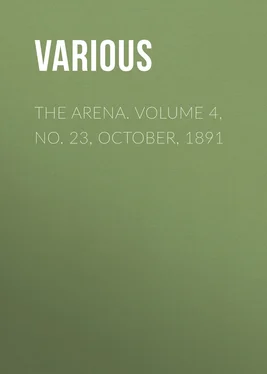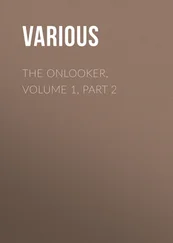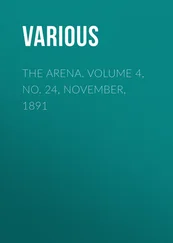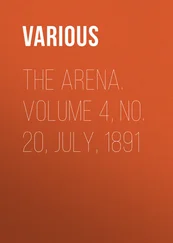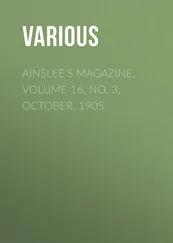Various - The Arena. Volume 4, No. 23, October, 1891
Здесь есть возможность читать онлайн «Various - The Arena. Volume 4, No. 23, October, 1891» — ознакомительный отрывок электронной книги совершенно бесплатно, а после прочтения отрывка купить полную версию. В некоторых случаях можно слушать аудио, скачать через торрент в формате fb2 и присутствует краткое содержание. Жанр: foreign_antique, periodic, foreign_edu, на английском языке. Описание произведения, (предисловие) а так же отзывы посетителей доступны на портале библиотеки ЛибКат.
- Название:The Arena. Volume 4, No. 23, October, 1891
- Автор:
- Жанр:
- Год:неизвестен
- ISBN:нет данных
- Рейтинг книги:3 / 5. Голосов: 1
-
Избранное:Добавить в избранное
- Отзывы:
-
Ваша оценка:
- 60
- 1
- 2
- 3
- 4
- 5
The Arena. Volume 4, No. 23, October, 1891: краткое содержание, описание и аннотация
Предлагаем к чтению аннотацию, описание, краткое содержание или предисловие (зависит от того, что написал сам автор книги «The Arena. Volume 4, No. 23, October, 1891»). Если вы не нашли необходимую информацию о книге — напишите в комментариях, мы постараемся отыскать её.
The Arena. Volume 4, No. 23, October, 1891 — читать онлайн ознакомительный отрывок
Ниже представлен текст книги, разбитый по страницам. Система сохранения места последней прочитанной страницы, позволяет с удобством читать онлайн бесплатно книгу «The Arena. Volume 4, No. 23, October, 1891», без необходимости каждый раз заново искать на чём Вы остановились. Поставьте закладку, и сможете в любой момент перейти на страницу, на которой закончили чтение.
Интервал:
Закладка:
“The very room, coz she was in,
Seemed warm f’om floor to ceilin’,
An’ she looked full ez rosy agin
Ez the apples she was peelin’.
He kin’ o’ l’itered on the mat,
Some doubtfle o’ the sekle,
His heart kep’ goin’ pity-pat,
But hern went pity Zekle.
An’ yit she gin her chair a jerk
As though she wished him furder,
An’ on her apples kep’ to work,
Parin’ away like murder.
‘You want to see my pa, I s’pose?’
‘Wall,—no—I come dasignin’—’
‘To see my ma? She’s sprinklin’ clo’s
Agin to-morrer’s i’nin.’
To say why gals acts so or so,
Or don’t ‘ould be prosumin’,
Mebby to mean yes an’ say no
Comes natural to women.
He stood a spell on one foot fust,
Then stood a spell on t’other,
An’ on which one he felt the wust
He couldn’t ha’ told ye nuther.
Says he, ‘I’d better call agin;’
Says she, ‘Think likely, mister;’
Thet last word pricked him like a pin,
An’—wall, he up an’ kist her.
When ma bimeby upon ‘em slips,
Huldy sot pale ez ashes,
All kin’ o’ smily roun’ the lips
An’ teary roun’ the lashes.
For she was jes’ the quiet kind
Whose natures never vary,
Like streams that keep a summer wind
Snow-hid in Janooary.
The blood clost roun’ her heart felt glued
Too tight for all expressin’,
Till mother see how matters stood,
An’ gin ‘em both her blessin’.
Then her red come back like the tide
Down to the Bay o’ Fundy,
An’ all I know is they war cried
In meetin’ come nex’ Sunday.”
During the war, Great Britain sided principally with the South. This the North resented, and the Trent affair only added fuel to the flame. It was in one of the Biglow papers that Mr. Lowell spoke to England, voicing the sentiments and feelings of the Northern people. That poem was called “Jonathan to John,” and it made a great impression on two continents. It was full of the keenest irony, and though bitter, there was enough common sense in it, to make men read it, and think. It closes thus patriotically:—
“Shall it be love, or hate, John?
It’s you thet’s to decide;
Ain’t your bonds held by Fate, John,
Like all the world’s beside?’
Ole Uncle S. sez he, ‘I guess
Wise men forgive,’ sez he,
‘But not forgit; an’ some time yit
Thet truth may strike J. B.,
Ez wal ez you an’ me!’
‘God means to make this land, John,
Clear, then, from sea to sea.
Believe an’ understand, John,
The wuth o’ bein’ free.’
Ole Uncle S. sez he, ‘I guess,
God’s price is high,’ sez he;
‘But nothin’ else than wut He sells
Wears long, an’ thet J. B.
May larn, like you an’ me!’”
The work concludes with notes, a glossary of Yankee terms, and a copious index. The chapter which tells of the death of Parson Wilbur is one of the most exquisite things that Lowell has done in prose. The reader who has followed the fortunes of the Reverend Homer, is profoundly touched by the reflection that he will see him no more. He had grown to be a real personage, and long association with him had made him a friend. On this point, Mr. Underwood relates an incident, which is worth quoting here:—
“The thought of grief for the death of an imaginary person is not quite so absurd as it might appear. One day, while the great novel of ‘The Newcomes’ was in course of publication, Lowell, who was then in London, met Thackeray on the street. The novelist was serious in manner, and his looks and voice told of weariness and affliction. He saw the kindly inquiry in the poet’s eyes, and said, ‘Come into Evan’s and I’ll tell you all about it. I have killed the Colonel.’”
So they walked in and took a table in a remote corner, and then Thackeray, drawing the fresh sheets of manuscript from his breast pocket, read through that exquisitely touching chapter which records the death of Colonel Newcome. When he came to the final Adsum , the tears which had been swelling his lids for some time trickled down upon his face, and the last word was almost an inarticulate sob.
The volume “Under the Willows,” which contains the poems written at intervals during ten or a dozen years, includes such well-remembered favorites as “The First Snowfall,” for an autograph “A Winter Evening Hymn to My Fire,” “The Dead House” (wonderfully beautiful it is), “The Darkened Mind,” “In the Twilight,” and the vigorous “Villa Franca” so full of moral strength. It appeared in 1869. Mr. Lowell’s pen was always busy about this time and earlier. He was a regular contributor to the Atlantic in prose and verse. He was lecturing to his students and helping Longfellow with his matchless translation of Dante, besides having other irons in the fire.
It is admitted that the greatest poem of the Civil War was, by all odds, Mr. Lowell’s noble commemoration ode. In that blood-red struggle several of his kinsmen were slain, among them Gen. C. R. Lowell, Lieut. I. I. Lowell, and Lieutenant Putnam, all nephews. His ode which was written in 1865, and recited July 21, at the Harvard commemoration services, is dedicated “To the ever sweet and shining memory of the ninety-three sons of Harvard College, who have died for their country in the war of nationality.” It is, in every way, a great effort, and the historic occasion which called it forth will not be forgotten. The audience assembled to listen to it was very large. No hall could hold the company, and so the ringing words were spoken in the open air. Meade, the hero of Gettysburg, stood at one side, and near him were Story, poet and sculptor, fresh from Rome, and General Devens, afterwards judge, and fellows of Lowell’s own class at college. The most distinguished people of the Commonwealth lent their presence to the scene. There was a hushed silence while Lowell spoke, and when he uttered the last grand words of his ode, every heart was full, and the old wounds bled afresh, for hardly one of that vast throng had escaped the badge of mourning, for a son, or brother, or father, lost in that war.
“Bow down, dear land, for thou hast found release!
Thy God, in these distempered days,
Hath taught thee the sure wisdom of His ways,
And through thine enemies hath wrought thy peace!
Bow down in prayer and praise!
No poorest in thy borders but may now
Lift to the juster skies a man’s enfranchised brow.
O Beautiful! My Country! ours once more!
Smoothing thy gold of war-disheveled hair
O’er such sweet brows as never other wore,
And letting thy set lips,
Freed from wrath’s pale eclipse,
The rosy edges of their smile lay bare.
What words divine of lover or of poet
Could tell our love and make thee know it,
Among the nations bright beyond compare?
What were our lives without thee?
What all our lives to save thee?
We reck not what we gave thee;
We will not dare to doubt thee,
But ask whatever else, and we will dare.
“The Cathedral,” dedicated most felicitously to the late James T. Fields, the author publisher, written in 1869, was published early in the following year in the Atlantic Monthly , and immediately won the applause of the more thoughtful reader. It is a poem of great grandeur, suggestive in the highest degree and rich in description and literary finish. Three memorial odes, one read at the one hundredth anniversary of the fight at Concord Bridge, one under the old elm, and one for the Fourth of July, 1876, followed. The Concord ode appears to be the more striking and brilliant of the three, but all are satisfactory specimens, measured by the standard which governs the lyric.
Читать дальшеИнтервал:
Закладка:
Похожие книги на «The Arena. Volume 4, No. 23, October, 1891»
Представляем Вашему вниманию похожие книги на «The Arena. Volume 4, No. 23, October, 1891» списком для выбора. Мы отобрали схожую по названию и смыслу литературу в надежде предоставить читателям больше вариантов отыскать новые, интересные, ещё непрочитанные произведения.
Обсуждение, отзывы о книге «The Arena. Volume 4, No. 23, October, 1891» и просто собственные мнения читателей. Оставьте ваши комментарии, напишите, что Вы думаете о произведении, его смысле или главных героях. Укажите что конкретно понравилось, а что нет, и почему Вы так считаете.
